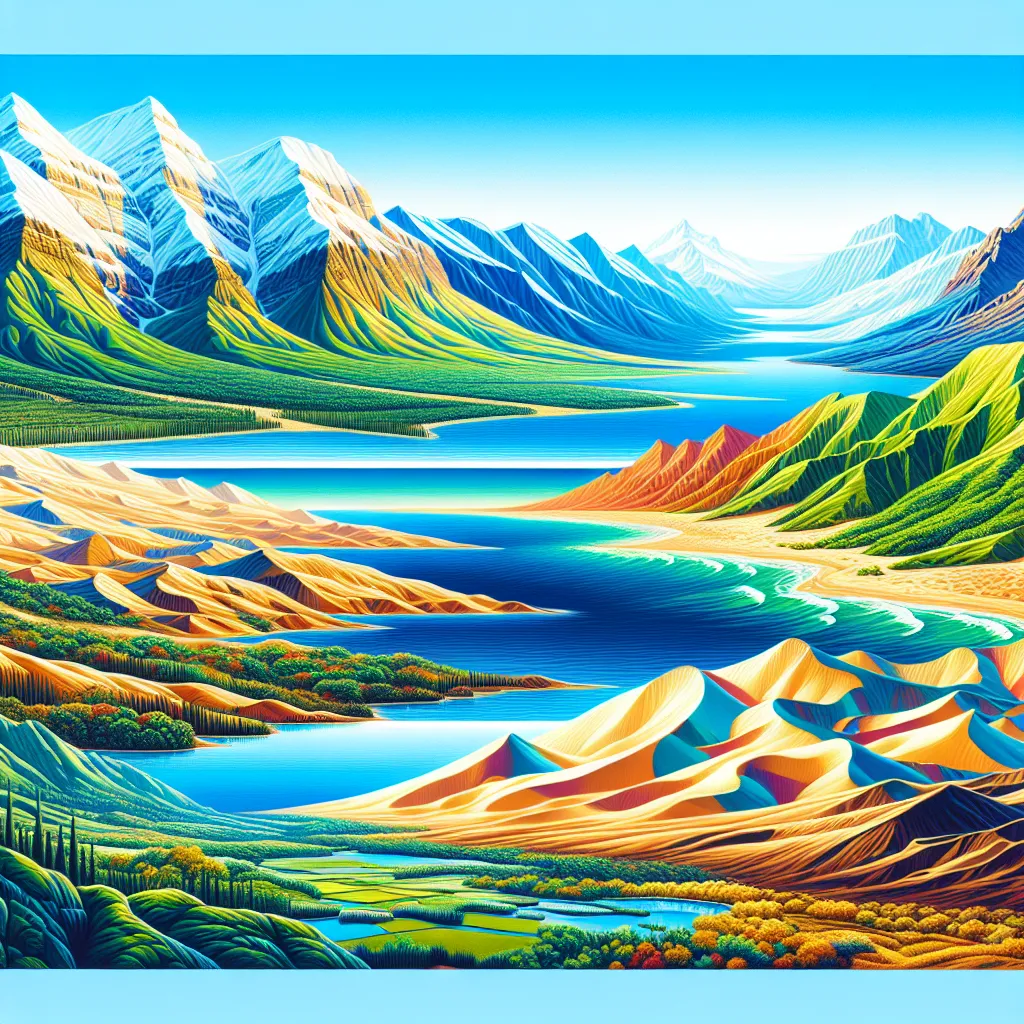What information about the geography and population of Israel are you interested in?

- What is the geography and culture of Israel?
- What is the economy and culture of Israel like: travel, holidays, and business opportunities?
- How is Sukkot celebrated and what is its historical context?
Geography of Israel
The geography and population of Israel is a unique and fascinating topic concerning the state officially known as the State of Israel, located in the southwestern part of the Asian continent. To the north, it borders Lebanon, to the northeast it borders Syria, the eastern borders of the country are shared with Jordan and the West Bank of the Jordan River, and to the southwest it neighbors Egypt and the Gaza Strip.
Israel is washed by the waters of three seas: the Mediterranean, the Dead, and the Red, each of which has its own unique character. The capital of the state is Jerusalem.
Natural landscape
The landscape of Israel is shaped by a variety of mountain systems, including the Carmel Mountains and the Golan Heights in the north, as well as the Arava Desert located south of the Dead Sea and the Negev in the south. The central part of the country encompasses the fertile Jordan Valley.
The climate conditions in Israel range from subtropical in the north to Mediterranean in the west.
- The temperature in January ranges from -6 °C to +18 °C;
- In July, the temperature reaches +24°C to +30°C.
- The rainy season usually lasts from November to March.
Population of the country
As of 2010, the population of Israel exceeded 7.5 million people, of whichThe Jewish community makes up the majority — 75.5%Among other ethnic groups, Arabs (20.4%), Druze, and other minorities can be highlighted.
Official languages in the country:Hebrew and ArabicIn the religious structure, more than half of the population practices Judaism.16.5% - Islam, and2.1% — ChristianityThere are also small groups practicing Buddhism, Hinduism, and a number of other beliefs.
Currency and time zone
Shekelis the official currency of the country. Israel's time zone is two hours ahead of Moscow time in winter and one hour ahead in summer.
Tourism in Israel
Traveling in Israel can be an excellent choice for tourists, as the country's geographical location offers a unique opportunity to relax by three seas — the Mediterranean, the Red, and the Dead Sea. The first two seas are known for their beautiful beaches, while the Dead Sea is famous for its healing properties and unparalleled climate.
The holy city of Jerusalem
Jerusalem, as a sacred city for Jews, Christians, and Muslims, is home to important religious monuments, among which stands outthe famous Western Wall.
For a detailed study of cities and their attractions, one can refer to related materials about Israel. Additionally, those interested in the real estate market in Israel can find useful overview articles on current trends.
How to get there
For those wishing to visit this amazing country, the most convenient and fastest option isair travelIsrael offers a multitude of unforgettable places to visit, making it a popular destination for tourists seeking adventure and new experiences.
Air transportation in Israel
Israel has a wide range of both regular and charter flights. The largest airlines providing air transport services include Transaero, Rossiya, Aeroflot, Ural Airlines, S7, as well as international carriers such as El Al Israel Airlines, Israir Airlines, and AirBaltic.
Passenger transfers are carried out from various Russian cities, including Moscow, St. Petersburg, Yekaterinburg, Novosibirsk, and other regions. The main airports in Israel are located in major cities such as Tel Aviv, Haifa, and Eilat, as well as in other areas of the country.
The political system of Israel
Now we should move on to the political system of Israel. It is a parliamentary republic where the key power is held by the president, whose term lasts seven years. The president is elected by the Knesset, which is the highest legislative body consisting of 120 members. The Knesset operates as a unicameral parliament.
The executive branch of power is in the hands of the prime minister, who leads the government of the country. The Supreme Court of Justice, or the Supreme Court, is the highest judicial body that ensures the enforcement of laws in the state.
International organizations
Israel actively participates in international organizations, including:
- The UN (where the country was admitted in 1949),
- Mediterranean Union,
- OECD, of which Israel became a member in 2010.
The country is divided into six administrative districts, which in turn are subdivided into fifty sub-districts and numerous neighborhoods.
The economy of Israel
In economic terms, since 2009, Israel's gross domestic product (GDP) has reached 205 billion dollars, making it one of the leading economies in Southeast Asia. Israel holds a prominent position in areas such as water resource conservation and the use of geothermal energy.
The high-tech sector, including programming and telecommunications, as well as active research in the natural sciences, play an important role in the country's economy. In addition, important sectors of the economy include:
- the extraction of mineral resources such as rock and table salt, bromine, phosphorites, and oil.
Agriculture and food security
Agriculture in Israel is focused on livestock, which includes both meat and dairy production.
9 October 2024
29 January 2025
29 January 2025
9 October 2024
29 September 2025
IsraelIt almost completely provides for its own food supply, covering up to 95% of the population's needs with local production. Tourism also plays a significant role in the country's economy, attracting more than two million tourists each year.
Famous companies
Among the well-known Israeli companies, the following can be highlighted:
- Israel Corporation,
- Elron Electronic Industries,
- Bezeq International (in the field of telecommunications),
- “Khevrat Hashmal” (energy),
- “Taasia Avirit” (aerospace engineering).
If you are interested in entrepreneurship in Israel, we recommend checking out information about business opportunities in this country.
Public holidays and weekends
Public holidays and weekends in Israel include many important dates. One of these holidays isPassoverwhich is celebrated on one day between March 26 and April 25. Also important is the seventh day of Passover, which is celebrated on one day between April 1 and May 1.
Other significant holidays include:
- World Independence Day, which is celebrated once during the period between May 15 and June 15,
- Shavuot is the day of the giving of the Torah, celebrated on one of the days between April 15 and May 15.
New YearandYom KippurThe Day of Atonement also holds great significance in the holiday calendar, occurring within the established dates between September 5 and October 5 for the New Year, and between September 14 and October 14 for Yom Kippur.

Celebration of Sukkot
The celebration of Sukkot, also known as the Feast of Tabernacles, lasts for one day between September 19 and October 19.
Historical context
Let's turn to the origins of the history of Ancient Israel: the first Jewish tribes began to settle the lands that now make up modern Israel around 1200 BC.
- In the 11th-10th centuries BC, the first state formations began to emerge here, such as the Union of Israel, and later Judah.
- Starting from the 8th century BC, these lands came under the influence of various empires, including the Assyrian, Babylonian, Persian, Macedonian, and several Hellenistic kingdoms.
Uprising and the Roman Empire
As a result of the uprising against the Greeks, which lasted from 152 to 37 BC, the Jews were able to temporarily regain their independence. However, starting in 63 AD, Judea became first a vassal region and then a province of the Roman Empire.
The constant uprisings led the Roman rulers to expel many Jews from these lands and rename the region to Syria Palaestina.
Conquests and regional governance
- In 614, Persian rule was established in the territory of Palestine.
- However, as early as 629, after the victory of the Romans, it came under the control of the Roman Empire, which at that time was known as Byzantium.
Muslim rule
For the next six centuries, from 638 to 1099, Palestine was under the rule of Muslim states.
In 1099, after the Crusaders' invasion, the Kingdom of Jerusalem was established, representing a Christian possession. However, in 1187, the famous Arab commander Saladin captured Jerusalem, and by 1291, the last stronghold of the Crusaders, the fortress of Acre, fell.
Ottoman Empire
The long era of the Ottoman Empire began in 1516 and lasted until 1917. During this time, Jews enjoyed relative freedom in civil and religious aspects, although they were prohibited from carrying weapons and serving in the army, and they were burdened with special taxes.
In 1799, the situation significantly escalated due to Napoleon's invasion of Palestine. Despite the initial successes of the French troops, they soon suffered defeat and left the region.
Egyptian dominance
In 1832, Egypt conquered Palestine and began implementing a series of reforms inspired by European models. However, this rule was short-lived – just eight years later, in 1841, the region returned under the control of the Ottoman Empire.
Jewish immigration
- The first wave of new Jewish immigration, known as the First Aliyah, was triggered by events in 1881-1882, caused by the persecution of Jews in Eastern European countries.
- The founder of the modern foundations of Zionism was Theodor Herzl, a prominent Jewish public figure and politician who sought to reunite the Jewish people in their historical homeland.
- The second wave of immigration occurred between 1910 and 1914 and was triggered by pogroms in the Russian Empire.
British mandate
Since 1918, Palestine has been under British control.
Conclusion
So, having completed my review of such an interesting and unique country as Israel, I cannot help but note how diverse and multifaceted its nature and culture are. Israel is not just a state on the map. It is a place where history meets modernity, where modern cities with developing economies and high technologies rise against the backdrop of ancient holy sites.
Traditions and beliefs hold immense significance in the lives of Israelis, and, as bitter as it may sound, modern realities require finding compromises and solutions to achieve peace. The uncertainty and challenges faced by the country cannot overshadow its beauty: majestic landscapes, rich flora and fauna shaped by a unique climate.
Diversity of the population
Diving into the culture, I was struck by how the multinational population of Israel, consisting of people of different beliefs and traditions, maintains harmony in their society. Among the Jewish majority live Arabs, Druze, and representatives of other nationalities, each with their unique culture and language. All of this creates an amazing mosaic, making Israel diverse and unique.
Opportunities for learning
One of the main lessons I've learned from my research is that Israel is not just a place that tourists seek to visit for beach vacations or spiritual enrichment. It is a realm full of life, innovation, and entrepreneurial energy.
- Tracks in the Golan Heights
- The vibrant markets of Tel Aviv
Every corner of the country hides something unique.
Result
In conclusion, I hope that my article has inspired you to explore Israel from a new perspective, to see it not just as a point on the map, but as a living, breathing, multi-layered society full of history, culture, and opportunities. Israel is waiting for its explorer in each of us — choose your direction and discover this amazing place in all its fullness.
Comment
Popular Posts
9 October 2024
9954
29 January 2025
1549
9 October 2024
1490
29 September 2025
411
Popular Offers

Subscribe to the newsletter from Hatamatata.com!
Subscribe to the newsletter from Hatamatata.com!
I agree to the processing of personal data and confidentiality rules of Hatamatata










